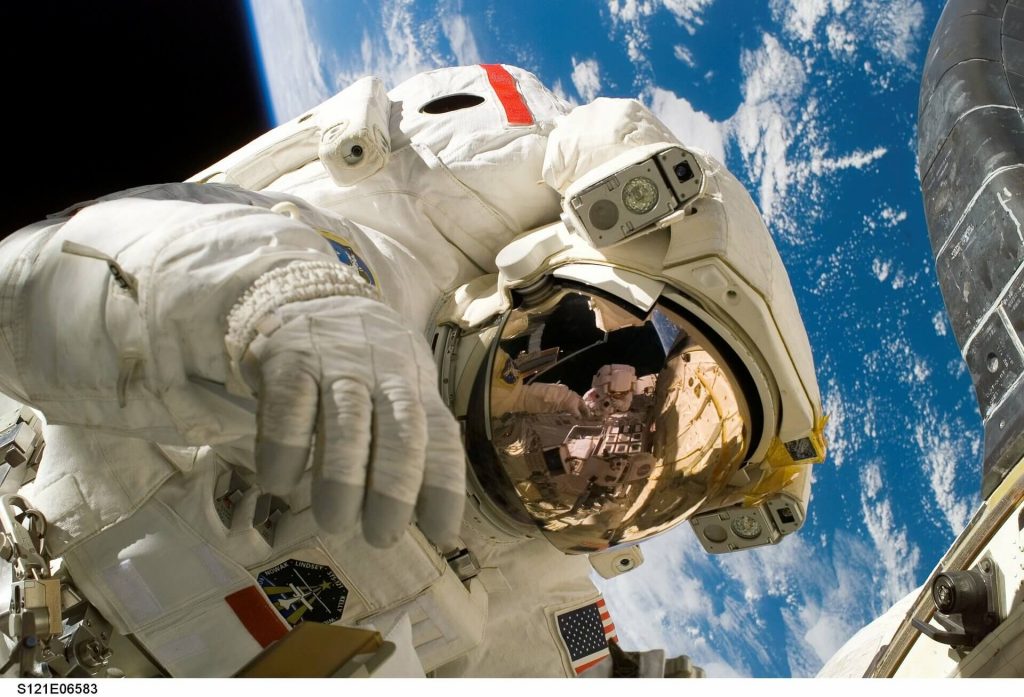Student-centric advice and objective recommendations
Higher education has never been more confusing or expensive. Our goal is to help you navigate the very big decisions related to higher ed with objective information and expert advice. Each piece of content on the site is original, based on extensive research, and reviewed by multiple editors, including a subject matter expert. This ensures that all of our content is up-to-date, useful, accurate, and thorough.
Our reviews and recommendations are based on extensive research, testing, and feedback. We may receive commission from links on our website, but that doesn’t affect our editors’ opinions. Our marketing partners don’t review, approve or endorse our editorial content. It’s accurate to the best of our knowledge when posted. You can find a complete list of our partners here.
How to Become an Astronaut: Everything You Need to Know
 By
Zach Skillings
By
Zach Skillings 
Zach Skillings is the Scholarships360 Newsletter Editor. He specializes in college admissions and strives to answer important questions about higher education. When he’s not contributing to Scholarships360, Zach writes about travel, music, film, and culture. His work has been published in Our State Magazine, Ladygunn Magazine, The Nocturnal Times, and The Lexington Dispatch. Zach graduated from Elon University with a degree in Cinema and Television Arts.
Full BioLearn about our editorial policies

Maria Geiger is Director of Content at Scholarships360. She is a former online educational technology instructor and adjunct writing instructor. In addition to education reform, Maria’s interests include viewpoint diversity, blended/flipped learning, digital communication, and integrating media/web tools into the curriculum to better facilitate student engagement. Maria earned both a B.A. and an M.A. in English Literature from Monmouth University, an M. Ed. in Education from Monmouth University, and a Virtual Online Teaching Certificate (VOLT) from the University of Pennsylvania.
Full BioLearn about our editorial policies

Exploring space is the stuff of many a kid’s dreams, but what does it take to actually become an astronaut? It should come as no surprise that it takes a lot of hard work and perseverance to join the ranks of NASA’s space travelers. Becoming an astronaut requires years of education and experience, and the application process is notoriously selective. But with enough determination, you may be able to achieve a career in space exploration. Read on to learn how to become an astronaut!
What’s it like being an astronaut?
In Greek, the word astronaut roughly translates to “star sailor.” While that’s certainly a glamorous job description, there’s more to being an astronaut than traveling through space.
When astronauts aren’t in space, they’re either training to go into orbit or supporting other missions from the ground. For instance, they may work in mission control and communicate with other astronauts in orbit. Other duties include developing the procedures used during spacewalks, helping scientists develop experiments, and performing other jobs in support of the ISS.
There are also different types of astronauts. Mission specialists conduct experiments, launch satellites, and maintain spacecraft and equipment. Pilot astronauts serve as mission commanders and are responsible for the safety of the crew and spacecraft. Pay level depends on job position and experience level, ranging from $141,888 to $183,300.
Minimum requirements
If you have your sights set on becoming an astronaut, you’ll most likely be seeking employment with NASA. The emergence of private space companies such as SpaceX and Blue Origin have expanded opportunities for space travel, but NASA remains the best way to get your foot in the door. To be considered for an astronaut position with NASA, applicants must meet the following requirements:
- Be a U.S. citizen
- Possess a master’s degree* in a STEM field from an accredited institution
- Have 2 years of related professional experience OR at least 1,000 hours of flight time
- Pass the NASA astronaut physical test
*The master’s degree requirement can also be met by:
- 2 years of work toward a doctoral program in a related science, technology, engineering or math field
- A completed Doctor of Medicine or Doctor of Osteopathic Medicine degree
- Completion of a nationally recognized test pilot school program.
How to become an astronaut
Complete your schooling
Like any profession, the first step towards becoming an astronaut is obtaining the proper education. Since there’s no specific “astronaut major” in college, you have the freedom to shape your education to a certain extent.
You should start by establishing a strong math and science foundation in high school, then build on that during your undergraduate years. After earning your bachelor’s degree, you’ll need to obtain a master’s degree in a STEM field. In particular, NASA is looking for candidates with a degree in engineering, biological science, physical science, computer science, or mathematics. Let’s briefly discuss some fields of study that can help launch your career as an astronaut:
Electrical engineering
Many astronauts study engineering in school, and it’s not hard to see why. Engineers are designers, innovators, and problem-solvers. They can find practical solutions to pressing issues, which is a great skill to have when you’re traveling through space at 17,000 miles per hour. Space shuttles rely heavily on electronic systems, which makes electrical engineering a particularly useful field of study for aspiring astronauts.
Astrophysics
According to NASA, the aim of astrophysics is to “discover how the universe works, explore how it began and evolved, and search for life on planets around other stars.” Sounds perfect for anyone looking to launch a career in space travel! By studying astrophysics, you’ll learn how to grapple with advanced mathematical and scientific concepts such as quantum mechanics and string theory.
Aeronautics
Studying the science of air travel can also help get your foot in the door with NASA. With a degree in aeronautics, you’ll have a working knowledge of aerodynamics, aircraft design, and flight engineering. Aeronautics students gain valuable skills in mathematics, problem-solving, critical thinking, and decision-making – all of which are needed to become an astronaut.
Biochemistry
Biochemistry explores how chemical changes affect living organisms, which makes it a valuable field of study for astronaut hopefuls. In space, the human body behaves differently than it does on earth. Weightlessness causes disruptions in absorption and metabolism, which means that astronauts have different nutritional requirements. Biochemists play an important role in ensuring the physical wellbeing of astronauts while they’re in space.
Geology
A degree in geology is another great starting point for aspiring space travelers. Geologists investigate the physical structure of the earth as well as moons, asteroids, and other planets. Geology is an especially important field of study considering NASA has its sights set on sending humans to Mars. Geologists are needed to study the volcanoes, tectonics, cratering, and massive storms that have shaped the Red Planet’s unique terrain.
Gain related professional experience
After completing your schooling, the next step on your journey toward space is to acquire two years of related professional experience. One way to gain this experience is through teaching, either at the K-12 or college level. Alternatively, you can meet professional qualifications by gaining 1,000 pilot-in-command hours aboard a jet aircraft. Joining the military or becoming a commercial pilot is a popular way to rack up this kind of flight time. In fact, a large number of astronauts begin their careers as pilots. Joining the military while you’re in college may even be a great way to fast track your timeline to becoming an astronaut!
Apply for a position
Once you obtain the necessary professional experience, you’ll be ready to apply for an astronaut position. Application procedures vary slightly between civilian applicants and active-duty military applicants. Regardless of how you apply, though, there’s no denying that the competition is fierce. Out of more than 12,000 applicants in 2021, only 10 people were chosen to make up NASA’s new astronaut class. That amounts to an acceptance rate of 0.08%.
Once you apply, your qualifications will be reviewed by NASA’s Astronaut Selection Board. A small group of the most highly qualified candidates are invited for interviews at NASA’s Johnson Space Center in Houston, Texas. Out of those interviewed, about half are invited back for second interviews. From that select group, NASA’s astronaut candidates are selected.
As part of the screening process, applicants must pass NASA’s long-duration space flight physical. The test requires candidates to:
- Have 20/20 eyesight (correction allowed)
- Seated blood pressure of 140/90 or below
- Be between 5’2” and 6’3” in height
- No age requirements, but the average age of astronauts is 34 according to NASA
Complete the training program
If you’re selected as an astronaut candidate, the next step is to complete the two-year training program. Keep in mind that selection as an astronaut candidate does not guarantee selection as an astronaut. Final selection as an astronaut hinges upon successful completion of the training period. The program consists of both physical training and classroom study.
Physical training includes:
- Spacewalk skills training
- Robotics skills training
- Aircraft flight readiness training
Classroom training includes:
- Medical procedures
- Emergency situations
- Public speaking
Since crew members on the ISS must be able to communicate with the Russian Mission Control Center, candidates also take Russian language classes. After all that, you’ll be ready to begin work as a fully qualified astronaut!
Other career options
Becoming an astronaut isn’t the only way to achieve a career in space. There’s actually lots of jobs related to space exploration. Below we’ve listed a few of the most popular space-related professions:
| Aerospace engineers: design and create spacecraft, aircraft, and missiles |
| Computer hardware engineers: develop computer systems and equipment used to measure activity in outer space or on Earth |
| Electronics engineers: design and maintain equipment in spacecraft and aircraft |
| Atmospheric scientists: study the atmosphere using satellites and radar systems |
| Astronomers: observe objects within the universe such as planets, stars, and galaxies |
| Plasma physicists: study plasmas, which occur naturally both in interplanetary space and in stars |
| Aerospace engineering technicians: help engineers design, develop, and test products needed for space exploration |
| Meteorological technicians: measure weather or climate-related conditions to produce data for meteorologists |
| Photographers: document the progress of space projects by taking photos of important milestones |
| Public relations specialists: keep the public informed about space activities and discoveries |
| Technical writers: work closely with scientists to present complex information in a way that the public can understand |
As you can see, there’s more than one way to achieve a career in space. But if you have your heart set on becoming an astronaut, don’t let the rigorous application process stand in your way. After all, nothing in the world compares to sailing amongst the stars!
Frequently asked questions about how to become an astronaut
Is it hard to become an astronaut?
Is 25 too old to be an astronaut?
Do astronauts do a lot of math?


